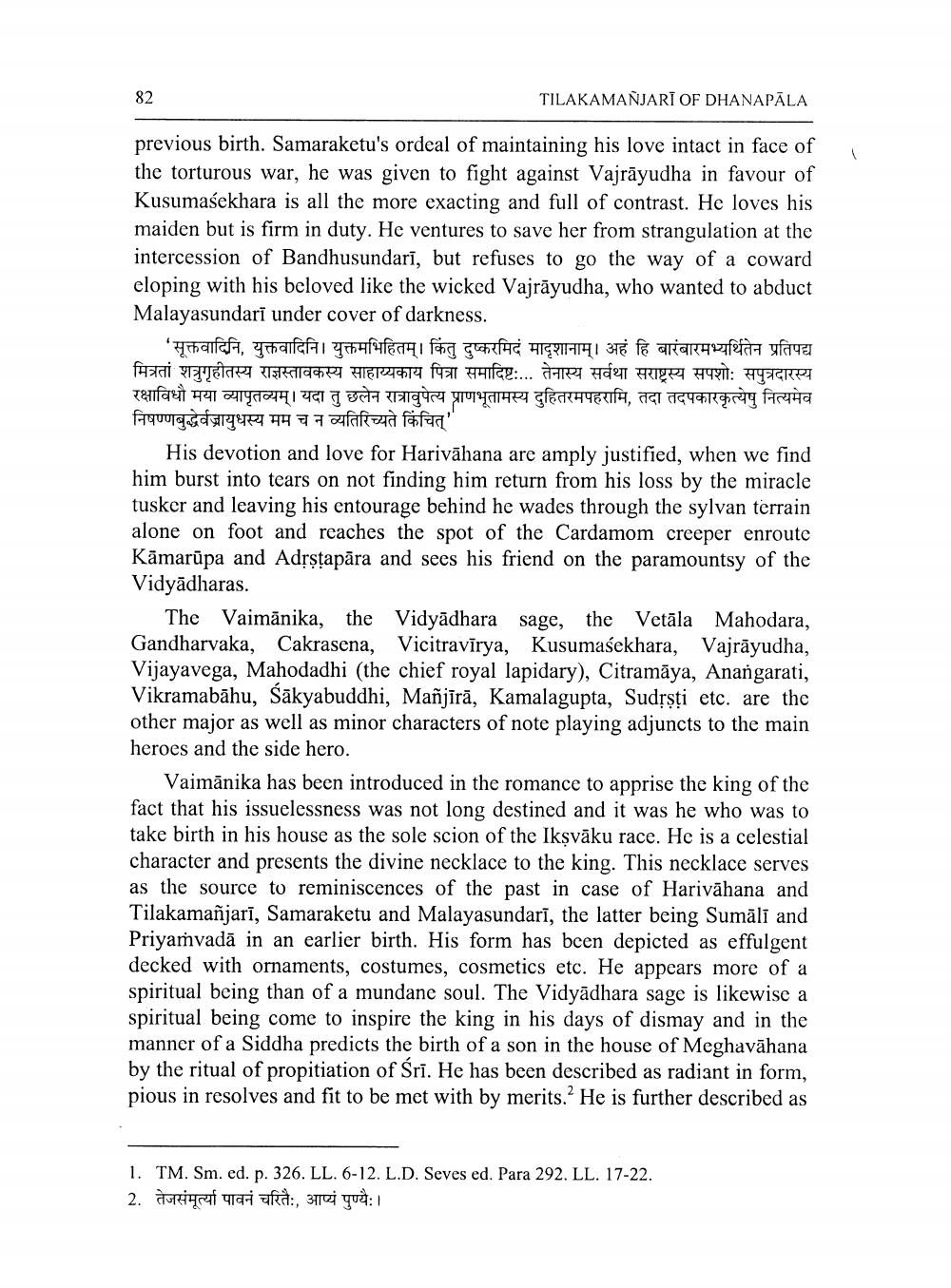________________
82
TILAKAMANJARĪ OF DHANAPĀLA
previous birth. Samaraketu's ordeal of maintaining his love intact in face of the torturous war, he was given to fight against Vajrāyudha in favour of Kusumasekhara is all the more exacting and full of contrast. He loves his maiden but is firm in duty. He ventures to save her from strangulation at the intercession of Bandhusundarī, but refuses to go the way of a coward eloping with his beloved like the wicked Vajrāyudha, who wanted to abduct Malayasundarī under cover of darkness.
'सूक्तवादिनि, युक्तवादिनि। युक्तमभिहितम्। किंतु दुष्करमिदं मादृशानाम्। अहं हि बारंबारमभ्यर्थितेन प्रतिपद्य मित्रतां शत्रुगृहीतस्य राज्ञस्तावकस्य साहाय्यकाय पित्रा समादिष्टः... तेनास्य सर्वथा सराष्ट्रस्य सपशोः सपुत्रदारस्य रक्षाविधौ मया व्यापृतव्यम्। यदा तु छलेन रात्रावुपेत्य प्राणभूतामस्य दुहितरमपहरामि, तदा तदपकारकृत्येषु नित्यमेव निषण्णबुद्धेर्वज्रायुधस्य मम च न व्यतिरिच्यते किंचित्'
His devotion and love for Harivāhana are amply justified, when we find him burst into tears on not finding him return from his loss by the miracle tusker and leaving his entourage behind he wades through the sylvan terrain alone on foot and reaches the spot of the Cardamom creeper enroute Kāmarūpa and Adrstapāra and sees his friend on the paramountsy of the Vidyādharas.
The Vaimānika, the Vidyādhara sage, the Vetāla Mahodara, Gandharvaka, Cakrasena, Vicitravīrya, Kusumasekhara, Vajrāyudha, Vijayavega, Mahodadhi (the chief royal lapidary), Citramāya, Anangarati, Vikramabāhu, Sākyabuddhi, Mañjīrā, Kamalagupta, Sudrsti etc. are the other major as well as minor characters of note playing adjuncts to the main heroes and the side hero.
Vaimānika has been introduced in the romance to apprise the king of the fact that his issuelessness was not long destined and it was he who was to take birth in his house as the sole scion of the Ikşvāku race. He is a celestial character and presents the divine necklace to the king. This necklace serves as the source to reminiscences of the past in case of Harivāhana and Tilakamañjarī, Samaraketu and Malayasundarī, the latter being Sumāli and Priyamvadā in an earlier birth. His form has been depicted as effulgent decked with ornaments, costumes, cosmetics etc. He appears more of a spiritual being than of a mundane soul. The Vidyādhara sage is likewise a spiritual being come to inspire the king in his days of dismay and in the manner of a Siddha predicts the birth of a son in the house of Meghavāhana by the ritual of propitiation of Sri. He has been described as radiant in form, pious in resolves and fit to be met with by merits. He is further described as
1. TM. Sm. ed. p. 326. LL. 6-12. L.D. Seves ed. Para 292. LL. 17-22. 2. ducir a ufa:, 3170 que:




